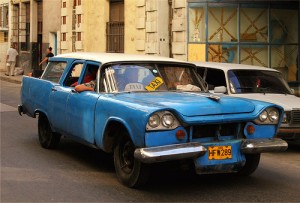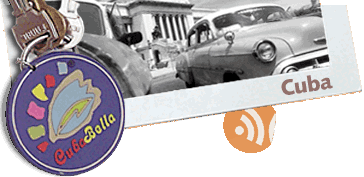Cuba takes first step to allow free enterprise and repair its crisis hit economy
 Dozens of Cubans, hoping to use their private cars as taxis, lined up outside the Transport Ministry’s office today in central Havana. They were waiting to apply for a taxi license, an option that hasn’t been available to Cuban citizens in a decade.
Dozens of Cubans, hoping to use their private cars as taxis, lined up outside the Transport Ministry’s office today in central Havana. They were waiting to apply for a taxi license, an option that hasn’t been available to Cuban citizens in a decade.
According to sources, Cuba stopped granting new licenses for private taxis in October 1999, but lifted the restrictions in January of this year. Authorities started handing out taxi permissions in May, but were so inundated with requests that they quickly suspended the program in Havana, and only resumed in earnest on Friday.
Private taxi service isn’t exactly new in Cuba, but it isn’t exactly legal either. People who are lucky enough to own cars-mostly made before the Cuban Revolution in 1959-sometimes give rides to people at steep prices, and just hope they don’t get caught. There also exists a separate fleet of modern taxis that cater only to foreigners and tourists, with expensive fares to match the more modern wheels.
So far, the Cuban government hasn’t said how many licenses it will grant, or how long the reinvigorated program will last. New taxi drives, after paying a monthly fee of $21.50, think they can pull in about $10 a month in fares, hoping to charge about fifty cents a trip.
Many on the communist island are happy about the government’s move, which was designed to alleviate serious transportation issues. On an island where people often have to wait hours to get a ride in a very cramped bus or hitchhike to work, the option is a lifesaver for many.
Yet, others aren’t so thrilled.
“This is going to mean more competition,” said 35-year-old Manolo Rodriguez, one of about 50 already-licensed taxi drivers waiting under the shade of a tree-lined street next to Cuba’s majestic capitol dome. Rodriguez says he spends most of his 12-hour day waiting his turn in line behind other taxis, since cruising for fares uses up lots of fuel. “If they keep giving out licenses I may only be able to get three trips a day, and that will really affect my income.”
While no one can hail the issuance of private taxi licenses as the beginning of major free market reforms in communist Cuba, it’s still a good sign that Raúl Castro is willing to consider some baby-step changes of which his brother Fidel would have disapproved. The taxi move comes on the heels of the Cuban government’s allowance of private farms as a way to utilize land more efficiently.
While communist bureaucracy may end up having its way with the private farms, private taxi licenses should be less burdensome to the government. Plus, any positive changes in the transportation situation should be noticeable right away.
Hopefully the private taxi program will be successful enough that Raúl will consider other options for private ownership by Cuban citizens in the future and also open other sectors to free enterprise.



